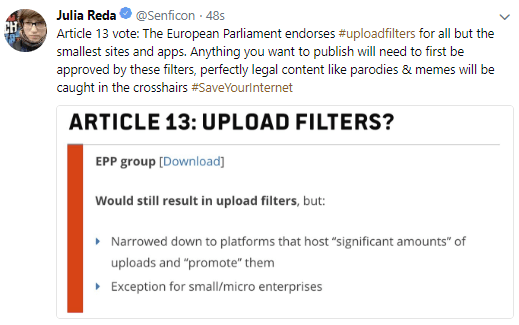 Two years ago the European Commission announced its plans to modernize EU copyright law.
Two years ago the European Commission announced its plans to modernize EU copyright law.
While the plans initially received little mainstream attention, in recent months there has been an outpouring of opinions, warnings, and advice from both supporters and opponents.
The issue that grabbed most headlines is the “upload filter” language specified in Article 13 of the proposal.
While the word “filter” has been removed following earlier critique, the Article would require service providers that are not properly licensed to remove infringing works. In addition, they have to ensure that these works are not reuploaded anywhere on their servers, which is generally achieved by filtering.
The Legal Affairs Committee of the Parliament (JURI) adopted the proposals in June, a major setback for opponents. However, a month later the European Parliament said no to the Copyright Directive mandate. This meant that the controversial copyright reform proposal would be opened for amendments and a new vote.
Over the past several weeks, more than 100 amendments were submitted, several of which proposed an alternative to the original Article 13. These changes were presented in a plenary session this afternoon, where Members of European Parliament (MEPs) submitted their votes.
In a plenary vote, 438 MEPs voted to support the Article 13 proposal put forward by the Rapporteur Axel Voss’ EPP group. 226 MEPs voted against and there were 39 abstentions.
This is a revised version of the original proposal, but one that would still pave the way for upload filters.
“The European Parliament endorses #uploadfilters for all but the smallest sites and apps. Anything you want to publish will need to first be approved by these filters, perfectly legal content like parodies & memes will be caught in the crosshairs,” Reda notes.

Small, under current European law, means a service which employs fewer than 50 persons, with an annual turnover or annual balance sheet total that does not exceed 10 million euro.
“Today’s decision is a severe blow to the free and open internet. By endorsing new legal and technical limits on what we can post and share online, the European Parliament is putting corporate profits over freedom of speech and abandoning long-standing principles that made the internet what it is today,” Reda adds in a separate statement.
Many rightsholder groups are pleased with the outcome. They believe that this will bridge the so-called “value gap,” making it easier to negotiate licensing deals with user-generated platforms.
“In spite of a very aggressive campaign against the proposed Copyright Directive, the Members of the European Parliament voted in favour of authors and the recognition that they need to be remunerated by whoever exploits their works.” says Cécile Despringre, Executive Director of the Society of Audiovisual Authors.
The EU Parliament also voted on proposed amendments of Article 11, after which opponents were met with disappointment. The MEPs voted in favor of a proposal by the EPP group, which keeps much of the original link tax language intact.
So what’s next?
Today’s vote is an important next step but it’s not the end of the lawmaking process. The Copyright Directive and the agreed amendments will now enter the stage of trilogue negotiations with the EU Council and Commission.
The result of these private discussions will determine the final text the European Parliament will have to vote on early next year. In most cases, the result of the trilogue negotiations is confirmed, but when that’s not the case the entire process of changes, negotiations, and a vote, starts over.
If the Copyright Directive is eventually adopted, individual Member States will have to implement it into local law, which is another hurdle that has to be passed.
—
Header photo credit CC BY-SA 3.0





